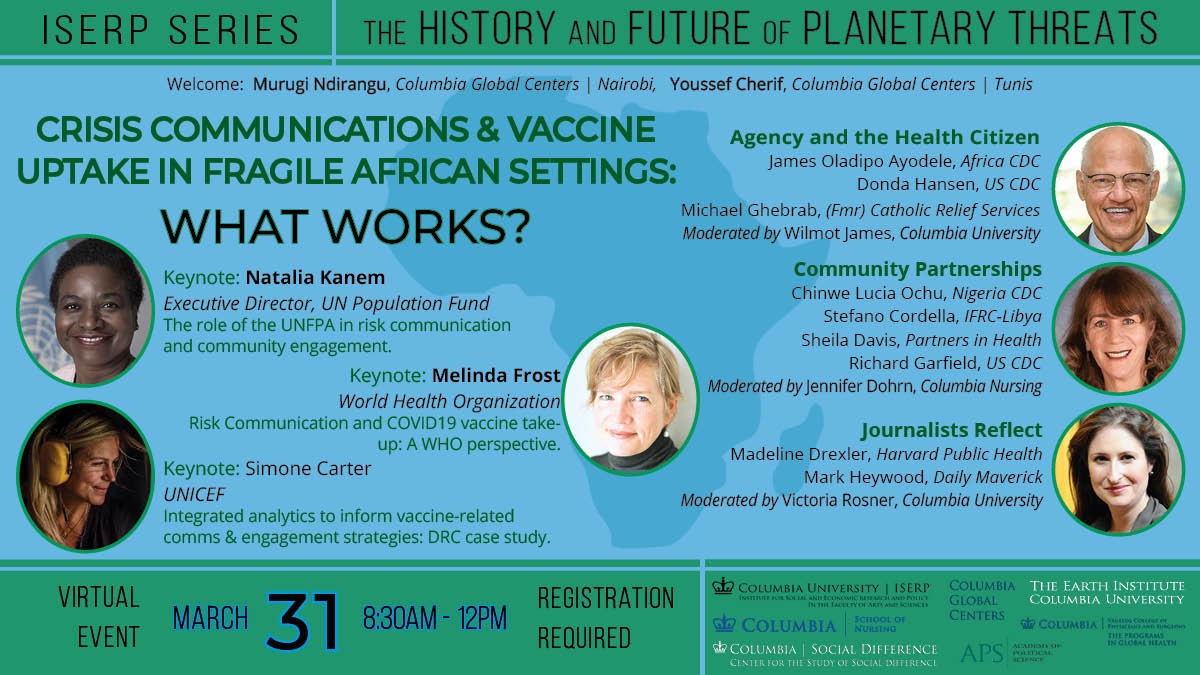Crisis communications and vaccine uptake in fragile African settings: What Works?

Wednesday March 31, 2021
8:30am - 12 Noon ET (New York)
As the COVID-19 vaccine campaign moves worldwide, innovative approaches to vaccine campaigns are badly needed. How to build trust in vaccines among a weary, anxious and often skeptical public? Join us for a conversation among African and US policymakers, activists, nursing leaders and academics to dissect the elements of effective risk communications campaigns, with an emphasis on empowering individuals and communities to lead the charge.
Two recent Columbia University studies offer insights into community-based risk communication models. On the Frontlines: Nursing Leadership in Pandemics documents the leading role nurses played during the Ebola outbreak in Liberia and Sierra Leone (2014-2016) and the COVID19 outbreak in New York City (2020). 1 A recent review of COVID19 pandemic responses in Egypt, Ethiopia, Kenya, Nigeria and South Africa launched by WHO DG Tedros at the Schmidt-Futures Forum January 12 2021 reveals how community health workers and nurses have emerged as the most trusted and effective risk communicators – precisely because they are part of the communities they care for, and demonstrably place their own lives on the line.
The challenges at this juncture are complex. Vaccines cannot displace public health and social measures. Communications must be tailored to the audience, and calibrated to context, country and culture. The recent proliferation of SARS-COV-2 variants presents novel hazards. We must listen continuously and specifically to local responses to vaccine communications and administration protocols. At the heart of any possible success will be trust, and trust must emerge from honest, evidence-based risk communication conveyed by individuals and leaders who have earned the confidence of the communities they serve.
Welcomes from:
- Murugi Ndirangu, Columbia Global Center Nairobi
- Youssef Cherif, Columbia Global Center Tunis
Featuring Keynotes:
- Natalia Kanem, United Nations Population Fund. The role of the UN Population Fund in risk communication and community engagement - especially as it affects women and girls of reproductive age - during the COVID19 pandemic in Africa.
- Simone Carter, UNICEF. Using integrated analytics to inform vaccine-related communication and engagement strategies: case study from the DRC.
- Melinda Frost, World Health Organisation. Risk Communication and COVID19 vaccine take-up: A WHO perspective.
Panel Discussion: Agency and the Health Citizen: How do we acknowledge the agency of citizens in health decision-making? How do we build communications infrastructure from the local level up, rather than top-down?
- Moderated by Wilmot James, ISERP, Columbia University
- Donda Hansen, US CDC. Learning Vaccine-related lessons from the Ebola Virus Disease Outbreak in the Democratic Republic of the Congo
- Michael T Ghebrab, Independant Consultant and former veteran of Catholic Relief Services. Working in pre and post crisis situations in South Sudan, Uganda and Sierra Leone.
Panel Discussion: Community Partnerships: How can community partnerships drive vaccine uptake? How do we ensure that public health communications are attuned to those community values, beliefs, and norms that matter?
- Moderated by Jennifer Dohrn, Columbia University, School of Nursing
- Chinwe Lucia Ochu, Nigerian CDC. A Nigerian/West African Perspective on Building Community Partnerships and COVID19 Vaccination Strategies.
- Stefano Cordella, International Federation of Red Cross and Red Crescent. Community Engagement, Risk Communication and Rolling out Vaccines in War-Torn countries – The Case of Libya
- Sheila Davis, Partners in Health. A Justice Perspective on Risk Communication and Vaccine Take-Up.
- Richard Garfield, US CDC. Reflection on panelist presentations.
Panel Discussion: Journalists Reflect
- Moderated by Victoria Rosner, Columbia University, English and Comparative Literature
- Madeline Drexler, Harvard T.H. Chan School of Public Health. Pandemic Response and Risk Communication: Lessons from Bhutan.
- Mark Heywood, Daily Maverick (South Africa). An Activist’s Perspective on science communications … what we learnt from the HIV/AIDS pandemic.
The full program with speaker biographies can be found for download on this page, to the right.
ISERP Series: The History and Future of Planetary Threats
In this series, ISERP convenes meetings to examine historic and contemporary catastrophic risks and hazards, whether natural, accident or deliberate, in the following domains: geological, biological, epidemic infectious disease, environmental, chemical, extreme weather, radiological and nuclear, or combinations of these. By catastrophic we understand to mean classes of events that could lead to sudden, extraordinary, widespread disaster beyond the collective capacity of national and international organizations and the private sector to control, causing severe disruptions in normal social functioning, heavy tolls in terms of morbidity and mortality, and major economic losses; in sum, events that may well cause a change the direction of history. Nuclear falls into a class of its own, because it can result in the annihilation of life on planet earth and the end of history as we know it.
This event is co-sponsored by:
- Center for Pandemic Research at the Institute for Social Research and Policy (ISERP)
- Frontline Nurses: Center for the Study of Social Difference
- School of Nursing
- Program in Vaccine Education, Vagelos College of Physicians and Surgeons
- Columbia Global Centers-Nairobi and Tunis
- Earth Institute
- Academy of Political Science
